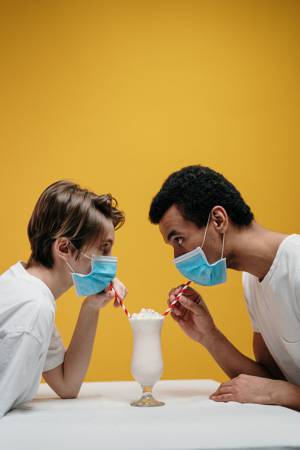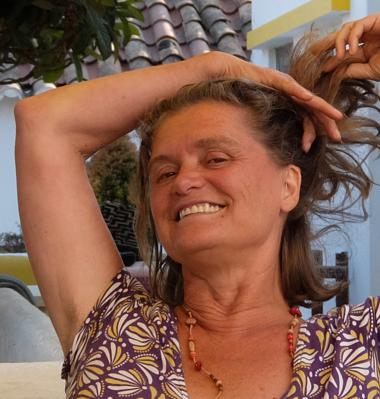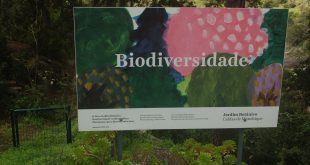Thursday, the 23rd Abril 2020
by Leila Dregger
At the beginning of this pandemic, the imprisoned journalist Julian Assange, foreseeing the imminent economic crisis, phoned Yanis Varoufakis, a former finance minister of Greece, to say, “From now on, everything is possible.” Varoufakis replied, “Yes, but also in a good way.”
I think of this dialogue now that everyone is talking about how we can get back to normality. As I am still enjoying this new situation, I don’t want to go back to normality yet. I have a new hobby: I’m collecting positive news about confinement.
For example, I have a friend who lives in a city, in a building inhabited by 14 children between the ages of 5 and 13. Next to the building is some open land, where they all play together despite their differences in age, as there are no other children to be found there at this time. They have invented different games that five-year-olds and thirteenyear-olds can both take an equal part in. I bet these games will be an abiding lifelong memory for them, because of the deep sense of belonging that they create.

I don’t want to go back to normality. Normality was not normal for most of this Earth’s inhabitants, for the animals, for the forests or for the children! The crisis caused by coronavirus provides an opportunity for us to change this system, and at a social level, too. Currently, millions of people are noticing that, in times of crisis, the most important thing is to live in a good neighbourhood. Life is better for those who are actively involved in their neighbourhood, where they can enjoy a feeling of trust, where people don’t just depend on their own families or partners, where they have real connections – whether their neighbourhoods are located in cities or in villages. There is mutual support, people help each other and can sense what their neighbours need. In Portugal, this mutual support is traditional, and I call it the “thankyou system”: all forms of voluntary service help to strengthen the bonds between people and thus fortify the social network. Modern society destroys these links. When they don’t exist, everyone fends for themselves – which leads to people competing and fighting with one another.
Perhaps, in the future, we will be taught in history classes that this was what we learned from the coronavirus crisis: in difficult times, we cannot rely on the government, supermarkets or global supply chains. It’s our neighbours, their gardens, their understanding and strength, that bring us most support. The community is the most important resource for our survival.
As far as I’m concerned, this probably amounts to the most wonderful consequence of the crisis: seeing people everywhere recognising how precious human relationships are and how they deserve to be nurtured and preserved. Seeing people becoming interested in their next-door neighbours once again and watching them re-establish that contact. Of course, all those old fears will also come to the fore again – competition, envy, secrets and conflicts, everything that caused the doors to close in the first place. Is it worth remaining stuck in front of computers and televisions, filled with these hostile attitudes? No. We’ve been in this situation for too long now. After the coronavirus has gone, let’s move on. In all regions, there are ecological communities and villages. We can find them for example by searching the Global Ecovillage Network (ecovillage.org). It’s worth visiting these communities in order to discover new solutions. For example, we can learn about ways of socially accommodating people’s wishes to enjoy some time alone. Or ways of deepening our trust in each other. And about how rewarding diversity can be for a community. Social uniformity is also a monoculture. Everyone must be given a voice – children, old people and those who have a different opinion or another level of education. Everyone needs recognition – and the chance to do something for others. We have all adopted less socially correct attitudes – talking too much or saying nothing, lying, power games, angry outbursts – but it is possible to free ourselves of them. There are methods for achieving this which can be taught. By living as a community. As is already happening with those children in the city.
If we don’t learn how to live together as a community, then we will allow the world around us to be overrun by surveillance and monitoring systems. If we evolve, then everything is possible. A healthy community takes care of its livelihood and of nature responsibly. Community allotments, local produce, locally generated solar energy, water sources, microfinance schemes, cooperatives … if we are truly human, then everything is possible.
 Eco123 Revista da Economia e Ecologia
Eco123 Revista da Economia e Ecologia


